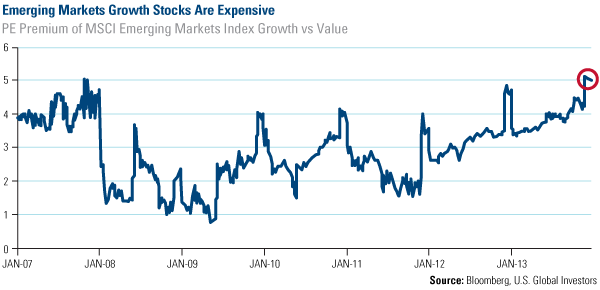Emerging Markets Radar (January 6, 2014)
Strengths
- Macau, the biggest casino hub in the world and the only in China, raked in $45 billion in gambling revenue in 2013, which is 18.6 percent more than in 2012, continuing to blaze ahead of rival gaming destinations. Earning seven times more than Las Vegas, Macau has seen revenue soar thanks to its proximity to vast numbers of increasingly wealthy Chinese. Macau was up 18.5 percent in December versus the consensus of 13.6 percent. Throughout the rest of the year, Macau was up 21.3 percent in November, 31.7 percent in October, 21.4 percent in September, 17.6 percent in August, 20.0 percent in July, 21.1 percent in June, 13.5 percent in May, and 13.1 percent in April.
- Within the $2 trillion global information technology (IT) market, China is expected to narrow the gap with industry leaders even further as the global economy is expected to expand rapidly this year. Total government and business spending in IT on the mainland is estimated to reach $124.5 billion, up 10.5 percent from last year, according to a new industry forecast published yesterday by Forrester Research.
- The HSBC China purchasing managers’ index (PMI) for December came in unchanged from the flash reading at 50.5, and on forecast. For key Australian commodities like iron ore, China is the top export destination. According to Hongbin Qu, Chief Economist, China & Co-Head of Asian Economic Research at HSBC, “the final PMI sustained the fifth, above-50 reading in a row thanks to a steady increase of new orders.”
Weaknesses
- Emerging market (EM) economic growth is almost universally weak relative to the trend, and Credit Suisse economists say that all major EM regions’ economies are running negative output gaps that will not close until 2015. At the individual country level, they estimate that only the economies of Malaysia and the Philippines are currently above potential, and that only Chile, Hungary and Turkey will swing into positive output gaps in 2014.
- China’s non-manufacturing purchasing managers’ index (PMI) fell to 54.6, which is the lowest since August. According to Businessweek, the official gauge for factory output dropped more than economists had projected, according to data on January 1, bringing it to a four-month low.
- Russia’s current account slid to the narrowest surplus since 1998 to $629 million from $1.1 billion reported in October. The median estimate projected a surplus of $8 billion before the first reading in October.
- Russian inflation held above the central bank’s target for a sixteenth-straight month in December, underscoring the bank’s reluctance to stimulate the economy by reducing borrowing costs. A freeze on fee charges by state monopolies such as Gazprom next year is a preferred way for the government to slow inflation.
Opportunities
- After the recent IPO of 500.com, many investors have become interested in China's lottery market. China's lottery sales totaled Rmb 279 billion at the end of November 2013, which is up Rmb 44.3 billion or 18.9 percent year-over-year. The CITIC Group expects total sales to exceed 300 billion for 2013, with a compound annual growth rate (CAGR) of 22.8 percent over the next three years, in which paperless lottery sales are forecast to grow at CAGR of 67 percent, to more than Rmb 100 billion in 2015.
- Following a year-end jump, a plunge in eurozone money market rates at the beginning of 2014, has eased pressure on the European Central Bank (ECB) for now to relax its monetary policy still further. However, the upward trend could resume in the next few months.
- GULP, or Growth at an Unlimited Price, was the style that worked in 2013 in emerging markets, says a JP Morgan strategist. This was due to weaker economic growth driving emerging market investors into growth stocks. The EM growth index is at a 50 percent price-to-earnings, premium to value, and the highest since 2007. Rising bond yields are typically a trigger for value to perform, and value outperformed growth in the past month.
Threats
- China’s bank loans to local governments dropped from 16.6 percent in 2012 to 13.9 percent in June 2013 as a percentage of the total-loan mix. Additionally, the bank audit process is becoming much more comprehensive.
- On Thursday, the baht currency and Thai stocks tumbled, according to Reuters. This came as uncertainty deepened about elections in February that anti-government forces are determined to block in their bid to oust Prime Minister Yingluck Shinawatra. Reaching a four-month low, the benchmark index dropped 2.7 percent to 1,263.72 before the midday break, and the baht lost for a tenth-straight day against the dollar. Investors are worried a February 2 poll will not go ahead, leaving Yingluck's government exposed to prolonged attacks by opponents.
- The ruling Fidesz party will discuss phasing out foreign-exchange (FX) loans at a parliamentary group meeting in January. This is after the Hungarian Supreme Court’s “beyond doubt” decision that existing FX loans must be kept valid.















